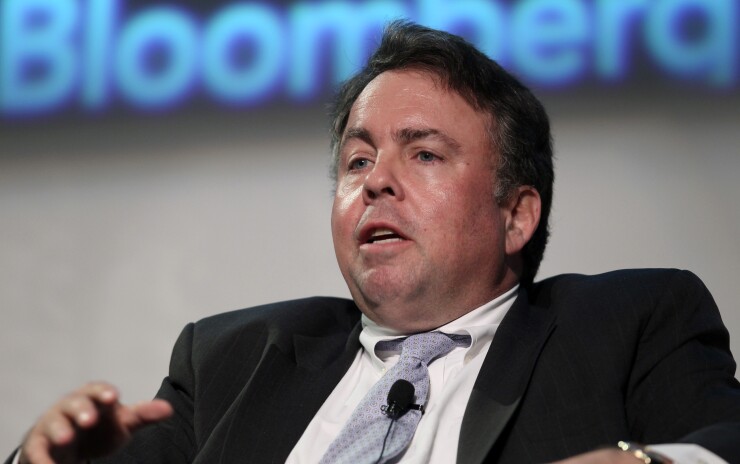California pulled IFS Securities from its underwriting team for an upcoming deal, citing concerns over the Atlanta-based firm
Whether the firm, whose fixed income operations include both equities and municipals, can overcome the scandal’s stain with both issuers and the sell-side and continue working as an underwriter is being questioned by market participants. The firm’s capital status and whether it has a relationship with a clearing house also was unclear as the firm has declined comment on any questions.
California pulled the firm this week from its underwriting team on an upcoming $2.3 billion sale. The firm, which served as a co-manager on a state issue in March, was listed on the team as late as last week.
“The treasurer has temporarily taken them out of the pool until there is more complete and better information about the facts and circumstances that led up to this allegation,” said a spokesman for California Treasurer Fiona Ma’s office. “This is largely a matter of avoiding distractions to either party.”

The decision should not be taken as a finding by the state that the firm is guilty of any wrongdoing. “It’s not up to us to form a judgment at this point, but it is up to us to avoid distractions for us and the underwriter,” the spokesman said.
The office retains the right to make team changes under its vendor rules. “These are vendors to the state treasurer’s office,” the treasurer’s spokesman said. “Until the bonds are offered and the bond purchase contract is signed, the treasurer always has a right to substitute a vendor. Once the contract is signed then the treasurer and vendor are bound by the contract.”
Market participants are also questioning how one employee, even a senior “trusted” one with an ownership stake, could allegedly engage in trades that put the firm at such risk. Some also wonder whether IFS’ situation will trigger heightened compliance scrutiny at other firms.
The employee is allegedly Keith Wakefield, according to sources. He allegedly shorted Treasuries in off-book transactions that lost at least $10 million, according to sources who said they believe the broker-dealer is capitalized at about $6 million. The firm reports on the Financial Industry Regulatory Authority’s site an event this month that resulted in “employment separation after allegations” that allegedly involved “placing fictitious trades.”
The firm has so far kept its doors open and sources say it hopes to stay in business under another branch IFS Capital Markets LLC, but officials have declined to comment beyond confirmation last week that it had fired an employee that engaged in “unauthorized transactions.”
The firm said then it self-reported the transactions to regulators who in turn told the firm to also notify the U.S. Department of Justice, a signal that a potential criminal probe may be underway.
The firm has also served as a co-manager on deals for Chicago and Illinois. Chicago’s finance department said IFS is not on the teams of any planned deals and declined to comment on future work. Illinois did not respond to questions. The firm has served as lead manager on 17 small transactions so far this year with the largest at $18.8 million and has served as a co-manager on five deals.
While issuers may at least initially shun the firm given the issues raised by California, the sell-side has its own risk-related issues.
“If I was a lead manager on a deal with them in the syndicate right now I would be trying to get them out. I just wouldn’t want that liability,” said an underwriting desk professional at a firm that has senior managed a deal with IFS serving as a co-manager.
“I wouldn’t even want them in the selling group where you don’t have to put up any capital” that’s required to potentially take down bonds in a deal. “You are involved in some risk if they are allotted some bonds or if they put in a priority order you have to fill.”
The firm made its most recent payroll, but employees “remain shellshocked” and are “considering their options,” said one industry source. Several other sources who work for competing firms said they know of multiple firms that are interested in poaching employees with the sales professionals especially in demand.
The source said given the work that went into building the firm, it’s understandable that chief executive officer and president Alex McKenzie doesn’t want to give up and is trying to ride out the regulatory issues and rebuild.
One source said information has circulated in the municipal community that the firm may try to put its retail wealth management network operation on the selling block, which could raise funding, but that information could not be confirmed.
The firm declined to respond to questions posed Wednesday over whether it raised new capital, had a clearing agreement on trades in place, and would try to sell the wealth management operations.
COMPLIANCE
Several market participants see the scandal, so far, as a one-off situation, in which a high-ranking employee was allowed too much leeway, but they question just what restrictions were in place with respect to the authority was granted on trade sizes.
Broker-dealers are subject to layers of regulation including the federal securities laws, state laws, and rules put in place by the Securities and Exchange Commission and self-regulatory organizations.
Firms doing business in the muni market are subject to the antifraud provisions in the federal laws, as well as the rules imposed by the SEC, FINRA, and the Municipal Securities Rulemaking Board.
The Department of Justice, SEC, and FINRA all have enforcement authority over broker-dealer firms. DOJ can bring federal criminal charges for violations of the securities laws, while the SEC can file civil lawsuits seeking damages and redress for investors who may have been harmed by illegal conduct. It is not uncommon for the DOJ and SEC to conduct parallel and cooperating investigations.
FINRA has the primary responsibility for enforcing MSRB rules, though the SEC can also do so. FINRA can impose fines and require firms to take corrective action, and can also bar individuals from the industry.
One industry source said FINRA may have been wrapping up a routine audit during the period in which the trades occurs. FINRA declined to comment.

“It will put a greater emphasis on compliance” going forward as firms will be looking to make sure there’s no unknown trade 'tickets hidden in the drawer' but that’s a good thing," said John Mousseau, chief executive officer and director of fixed income at Cumberland Advisors. “I think everybody has to take a better look at their compliance procedures when it comes to trades and the matching up of trades.”
“He’s not the first rogue trader and he won’t be the last. Bad bets on trades happen, but they are not supposed to be enough to potentially sink a firm,” Mousseau said. “It all comes back to compliance rules in place to capture it.”
On the surface, it looks like a one-off situation involving one employee. “This appears to be a case of failure to supervise,” said John Hallacy, contributing editor at The Bond Buyer. “Someone should have been monitoring him. Someone in compliance should have known what he was doing.”
While the scope may be limited, it “could force regulators to take a look at capital requirements for smaller firms” or prompt a round of new scrutiny on smaller firms’ compliance procedures, Hallacy said.
One Chicago-based banker at a small firm said he and his trading and underwriting desks are worried they will face more questions from issuers and regulators in the near term. “This casts a pall over other smaller, minority-owned firms," he said.
BACKGROUND
The firm apparently became aware of the transactions earlier this month when it was called upon to settle the trades and cover losses that had resulted given the recent Treasury rally.
When The Bond Buyer asked last week about the alleged trades that resulted in losses, officials declined to provide a details “given the complexity of the situation and ongoing investigations that it understands commenced.” It did confirm that it reported to its primary regulators that it had recently suffered substantial losses as a result of unauthorized securities transactions that did not involve customer assets by one of IFS Securities’ “most trusted senior employees” who was then terminated.
The firm confirmed that at the request of the SEC, it reported the matter to the Federal Bureau of Investigation and is cooperating with authorities. The firm did not fully have the funds to settle those trades, sources said.
The SEC does not comment on such cases.
IFS operates five corporate offices. In addition to its Atlanta headquarters, main offices are in Chicago, New York, Tampa and Miami Lakes, Florida. The equity trading desk is in Orlando and the fixed-income desk is in Chicago.
The minority firm was founded in Pennsylvania in 1993 and became a member of FINRA in 1996. IFS Securities Inc. describes itself as a full-service independent broker-dealer with retail and wholesale advisory networks. “IFS Securities has achieved strong growth on both sides of our business,” its website says.
The firm employs about 200 and Alex McKenzie has held the top since 2007. Sources said that figure includes about 30 municipal professionals and said the firm has grown from $300,000 in capital in 2012 to $6 million in 2019.
Lynne Funk contributed to this report.





